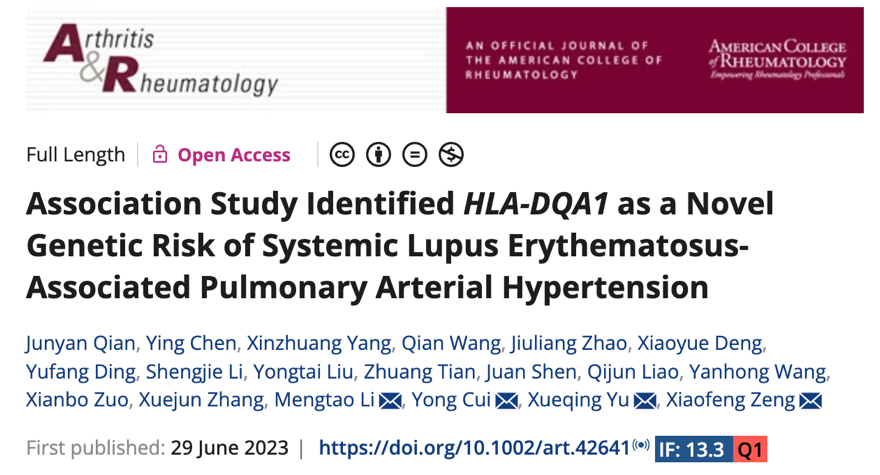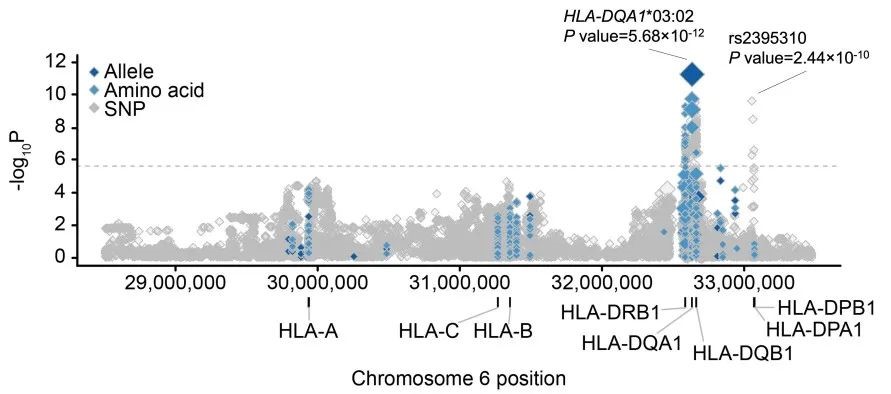A team led by Professor Zeng Xiaofeng and Professor Li Mengtao from the Department of Rheumatology at PUMCH, in collaboration with Guangdong Provincial People’s Hospital and the China-Japan Friendship Hospital, completed a genomic study on systemic lupus erythematosus-related pulmonary arterial hypertension (SLE-PAH). The research findings were recently published in the internationally prestigious journal “Arthritis & Rheumatology” (IF: 13.3). The study identified HLA-DQA1*03:02 as a novel genetic risk factor and a prognostic factor in SLE-associated PAH. These research findings enable new tools for the early diagnosis and accurate classification of SLE-PAH. The study was supported by the National Key R&D Program and National High Level Hospital Clinical Research Funding.

Systemic lupus erythematosus (SLE) is a systemic autoimmune disease characterized by multiorgan involvement. Pulmonary arterial hypertension (PAH) is a rare but one of the most severe complications in patients with SLE. SLE-PAH is marked by latent onset and fast progression. Its clinical manifestation is progressive elevation of pulmonary artery pressure, leading to right heart failure and even death. The pathogenesis of SLE-PAH is complex. Multiple studies have indicated that genetic factors, inflammatory responses, abnormal endothelial cell function, and pulmonary vascular remodeling may play crucial roles in the development of PAH. However, the exact mechanism underlying its onset remains unclear. Major histocompatibility complex (MHC) molecules, or human leukocyte antigen (HLA), are involved in antigen presentation and play a critical role in the genetic susceptibility to SLE. However, the role of HLA gene variations in SLE-PAH remains unknown.
The team conducted a study on the genetic susceptibility to SLE-PAH associated with variations in the MHC region. Patients were recruited from the CSTAR (the Chinese SLE Treatment and Research Group) registry: a total of 172 patients with SLE-associated PAH confirmed by right heart catheterization, 1,303 patients with SLE without PAH, and 9,906 healthy controls were included. The MHC region deep sequencing analysis identified a total of 19,881 variants, analysis of which shows that HLA-DQA1*03:02 was significantly associated with SLE-PAH susceptibility and related to worse clinical outcomes.

▲The association analysis results demonstrated a significant correlation between HLA-DQA1*03:02 and the onset of SLE-PAH (upper figure); HLA-DQA1*03:02 was found to be associated with poor prognosis in SLE-PAH patients (lower figure)
This study is the first genomic research targeting SLE-PAH in the world, filling a gap in this field. It provides new tools for the early diagnosis of PAH in SLE patients and establishes a theoretical basis for accurate classification and personalized management of SLE-PAH patients.
Written by and pictures courtesy of the Department of Rheumatology
Translated by Liu Haiyan
Reviewed by Jiang Nan and Wang Yao
